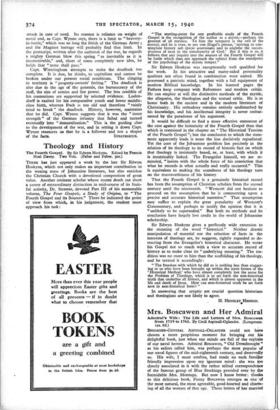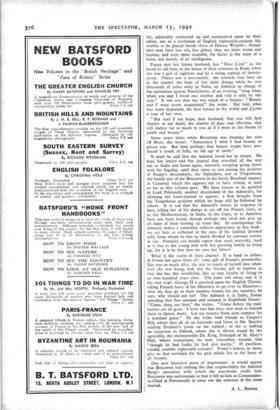Mrs. Boscawen and Her Admiral
BRIGADIER-GENERAL ASPINALL-OGLANDER could not have chosen a more propitious moment for bringing out his delightful book, just when our minds are full of the exploits of our naval heroes. Admiral Boscawen, " Old Dreadnought " as his sailors called him, was perhaps the most popular of our naval figures of the mid-eighteenth century, and deservedly so. His wife, I must confess, had made no such familiar friendly impression upon my ignorant mind: she was too dosely associated in it with the rather stilted correspondence of the famoui group of Blue Stockings presided over by the formidable Mrs. Montagu. But now I know better: thanks to this delicious book, Fanny Boscawen emerges as one of the most natural, the most agreeable, good-hearted and charm- ing of all the women of that age. These letters of her married
life, admirably connected up and commented upon by their editor, are as a revelation of English eighteenth-century life worthy to be placed beside those of Horace Walpole ; though they may have less wit, less glitter, they are more warm and human, and even more readable, for theirs is the story of a heart, not merely of an intelligence.
Fanny met her future husband, her " Dear Lord " as she loved to call him, at the house of their relations in Kent, when she was a girl of eighteen and he a rising captain of twenty- seven. Theirs was a love-match: she reminds him later on in the journal she kept of her daily doings while he was thousands of miles away in India, an Admiral in charge of the operations against Pondicherry, of an evening, " long since, when you and I loved one another and told it only by our eyes." It was not that she was much of a beauty : " Beauty and I were never acquainted," she wrote. She had, what was more important, the best nature in the world and £3,000 a year of her own.
" But may I not hope, dear husband, that you will find charms in my heart, the charms of ,duty and affection, that will endear me as much to you as if I were in the bloom of youth and beauty."
Some years later, while Boscawen was keeping the seas off Brest, she wrote : " Sometimes I wish I had beauty to please you. But then perhaps that beauty might have pro- duced a youth of folly, an old age of cards."
It must be said that the Admiral loved her in return. He kept her letters and her journal that travelled all the way out to India and home again, narrowly escaping going down with his flagship, until they came to rest among the archives of Fanny's descendants, the Oglanders, and at Tregothnan, the family seat of the Boscawens in the lovely Roseland country in Cornwall which she appears not to have visited, at least so far as this volume goes. We have reason to be grateful to Lord Falmouth, another descendant of the Admiral's, for allowing her letter-journal to appear : a first draught from the Tregothnan archives which we hope will be followed by others. It is sad that the Admiral's letters in response to hers, telling her of his doings at sea off the French coast, or in the Mediterranean, in India, at the Cape, or in America, have not been found, though perhaps one need not give up all hope of their turning up some day. In consequence the Admiral makes a somewhat indirect appearance in this book : we see him as reflected in the eyes of his faithful devoted wife, from whom he was so much divided by constant service at sea. Posterity can hardly regret that cruel necessity, hard as it was to the young wife with her growing family to bring up, for it is to that that we owe her letters.
What is the secret of their charm? It is hard to define. A bloom lies upon them all: some gift of Fanny's personality. She was so much alive, she put so much of herself into what- ever she was doing, had, too, the literary gift to express it, that she has this wonderful, this so rare faculty of living to us two hundred years after. The years roll away, and it is the year 1748: George II is perched upon the English Throne, taking French leave of his Ministers to go over to Hanover— after all, they go to their country houses for the summer, he says, why should not he? The Admiral is in India, Fanny spending that fine summer and autumn at Englefield Green: " Come, then, my love," she writes. " Come before the mul- berries are all gone. I have two fine trees that used to furnish them to Queen Anne. Let me reserve them next summer for a worthier guest." Or she walks with friends to Cooper's Hill, where they all sit on haycocks and listen to Mr. Smythe reading Denham's poem on the subject ; or she is making an excursion to Oxford, where she is shown round by the agreeable, the incomparable Dr. King, Principal of St. Mary's Hall, whose monument, we now remember, records that " though he had faults, he had also merits." 0 excellent, candid, sensible eighteenth century! Fanny's letters, in short, give us that nostalgia for the past which lies at the heart of all history.
One new historical point of importance : it would appear that Boscawen had nothing like that responsibility for Admiral Byng's execution with which the text-books credit him. Boscawen was unfortunate in that it fell to him as Commander- in-Chief at Portsmouth to carry out the sentence of the court martial.
A. L. ROWSE.























































 Previous page
Previous page